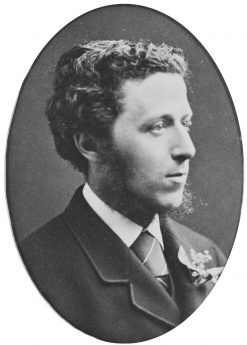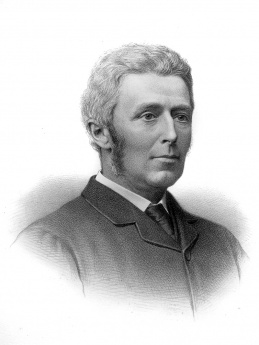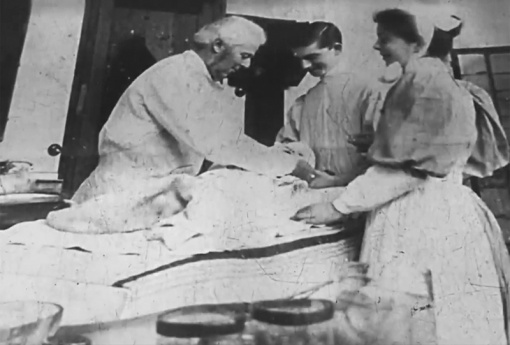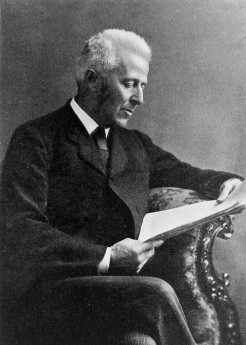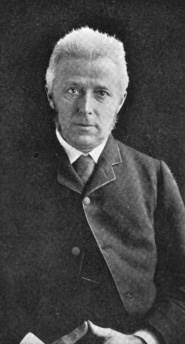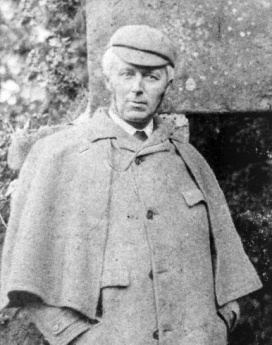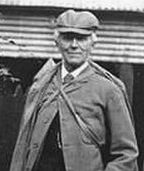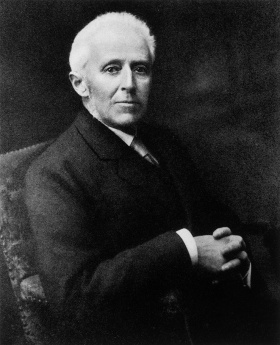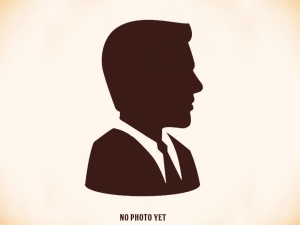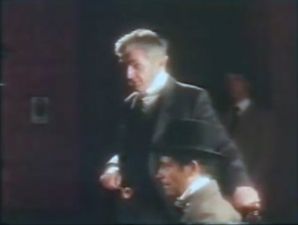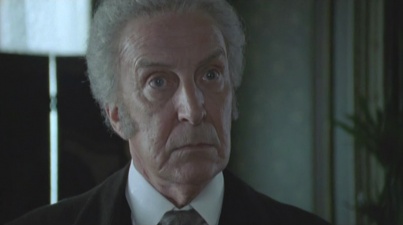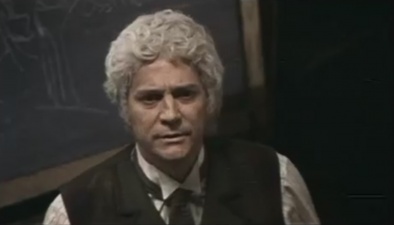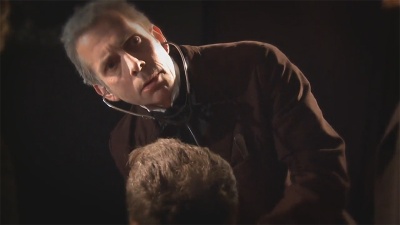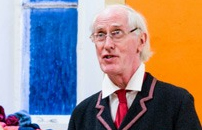Joseph Bell

(A Day with Dr. Conan Doyle, august 1892)
Joseph Bell, M.D., F.R.C.S.E., J.P.D.L. [1] (2 december 1837 - 4 october 1911) was a Scottish surgeon and lecturer at the medical school of the University of Edinburgh. He was also called Joe Bell.
Arthur Conan Doyle was a student of Joseph Bell during his medical studies at Edinburgh University from october 1877 to 1878. He also became his outpatient clerk in 1878 as Bell considered the young Arthur as the best student he ever had [2]. Joseph Bell used methods of observation and deduction on his patients and Conan Doyle was very impressed by his teacher's methods. This was an inspiration for the creation of Sherlock Holmes. That's why Joseph Bell was often named as "The Original of Sherlock Holmes".
In october 1892, the 12 first short stories of Sherlock Holmes were collected in book form The Adventures of Sherlock Holmes by George Newnes Ltd., and dedicated "To My Old Teacher, Joseph Bell, M.D., &c. of 2, Melville Crescent, Edinburgh". So Joseph Bell was asked to give his opinion about his former student. In december 1892, he wrote an article/review published in The Bookman. In december 1893, he gave an interview published in The Pall Mall Gazette : The Original of Sherlock Holmes.
In 1901, Bell shared platform and supported Conan Doyle as prospective Union candidate at Edinburgh.
In 1909, Bell and Conan Doyle were involved with other greatest surgeons and physicians of Great Britain to defend Albert T. Patrick, the alleged murderer of William M. Rice.
Arthur Conan Doyle about Joseph Bell
Autobiography
In his autobiography Memories and Adventures (1923), Arthur Conan Doyle wrote about Joseph Bell :
- « But the most notable of the characters whom I met was one Joseph Bell, surgeon at the Edinburgh Infirmary. Bell was a very remarkable man in body and mind. He was thin, wiry, dark, with a high-nosed acute face, penetrating grey eyes, angular shoulders, and a jerky way of walking. His voice was high and discordant. He was a very skilful surgeon, but his strong point was diagnosis, not only of disease, but of occupation and character. For some reason which I have never understood he singled me out from the drove of students who frequented his wards and made me his outpatient clerk, which meant that I had to array his outpatients, make simple notes of their cases, and then show them in, one by one, to the large room in which Bell sat in state surrounded by his dressers and students. Then I had ample chance of studying his methods and of noticing that he often learned more of the patient by a few quick glances than I had done by my questions. Occasionally the results were very dramatic, though there were times when he blundered. In one of his best cases he said to a civilian patient:
- "Well, my man, you've served in the army."
- "Aye, sir."
- "Not long discharged?"
- "No, sir."
- "A Highland regiment?"
- "Aye, sir."
- "A non-com. officer?"
- "Aye, sir."
- "Stationed at Barbados?"
- "Aye, sir."
- "You see, gentlemen," he would explain, "the man was a respectful man but did not remove his hat. They do not in the army, but he would have learned civilian ways had he been long discharged. He has an air of authority and he is obviously Scottish. As to Barbados, his complaint is elephantiasis, which is West Indian and not British." To his audience of Watsons it all seemed very miraculous until it was explained, and then it became simple enough. It is no wonder that after the study of such a character I used and amplified his methods when in later life I tried to build up a scientific detective who solved cases on his own merits and not through the folly of the criminal. Bell took a keen interest in these detective tales and even made suggestions which were not, I am bound to say, very practical. I kept in touch with him for many years and he used to come upon my platform to support me when I contested Edinburgh in 1901.
- When I took over his out-patient work he warned me that a knowledge of Scottish idioms was necessary, and I, with the confidence of youth, declared that I had got it. The sequel was amusing. On one of the first days an old man came who, in response to my question, declared that he had a "bealin' in his oxter."
- This fairly beat me, much to Bell's amusement. It seems that the words really mean an abscess in the armpit. »
And again in another chapter :
- « I thought of my old teacher Joe Bell, of his eagle face, of his curious ways, of his eerie trick of spotting details. If he were a detective he would surely reduce this fascinating but unorganized business to something nearer to an exact science. I would try if I could get this effect. It was surely possible in real life, so why should I not make it plausible in fiction? It is all very well to say that a man is clever, but the reader wants to see examples of it — such examples as Bell gave us every day in the wards. The idea amused me. »
Interview
In august 1892, Arthur Conan Doyle was interviewed by The Strand Magazine at his home. Extract :
- « I was clerk in Mr. Bell's ward. A clerk's duties are to note down all the patients to be seen, and muster them together. Often I would have seventy or eighty. When everything was ready, I would show them in to Mr. Bell, who would have the students gathered round him. His intuitive powers vere simply marvellous. Case No. 1 would step up. »
Letter
On 4 may 1892, Conan wrote a letter to Bell that he owe Sherlock Holmes to him :
- « It is most certainly to you that I owe Sherlock Holmes, and though in the stories I have the advantage of being able to place him in all sorts of dramatic positions I do not think that his analytical work is in the least an exaggeration of some effects which I have seen you produce in the out patient ward. »
Photos
Joseph Bell about Arthur Conan Doyle
In december 1892, Bell wrote an article published in The Bookman, The Adventures of Sherlock Holmes. Excerpt:
- « ... Dr. Conan Doyle's education as a student of medicine taught him how to observe, and his practice, both as a general practitioner and a specialist, has been a splendid training for a man such as he is, gifted with eyes, memory, and imagination. Eyes and ears which can see and hear, memory to record at once and to recall at pleasure the impressions of the senses, and an imagination capable of weaving a theory or piecing together a broken chain, or unravelling a tangled clue, such are implements of his trade to a successful diagnostician. If in addition the doctor is also a born story-teller, than it is a mere matter of choice whether he writes detective stories or keeps his strength for a great historical romance as is the White Company... »
In december 1893, he gave an interview for The Pall Mall Gazette, The Original of Sherlock Holmes. Excerpt:
- « I did not know he was coming out as a literary character, but I always regarded him as one of the best students I ever had. He was exceedingly interested always upon anything connected with diagnosis, and was never tired of trying to discover all those little details which one looks for. »
- « I should just like to say this about my friend Doyle's stories, that I believe they have inculcated in the general public a new source of interest — the kind of interest created by Richard Jefferies and the 'Son of the Marshes.' They make many a fellow who has before felt very little interest its his life and daily surroundings think that, after all, there may be much more in life if he keeps his eyes open titan he had ever dreamed of in his philosophy. There is a problem, a whole game of chess, in many a little street incident or trifling occurrence if one once learns how to make the moves. »
Adrian Conan Doyle about Joseph Bell
On 28 october 1943, Adrian Malcolm Conan Doyle (the 4th child of Arthur Conan Doyle) wrote a letter published in The Times about the origin of Sherlock Holmes, asserting that his father was himself Sherlock Holmes.
Articles about Joseph Bell
- 28.12.1893 : The Original of Sherlock Holmes (The Pall Mall Gazette)
- 03.02.1894 : The Original of Sherlock Holmes (Harper's Weekly)
- 09.01.1904 : The Original of Sherlock Holmes, by Harold Emery Jones (Collier's)
- 24.05.1909 : May Free Patrick: Original of Sherlock Holmes Becomes Interested in Case (The Washington Post)
Obituaries
- 05.10.1911 : Detective of the Surgery. Death of the Original Sherlock Holmes (Daily Express)
- 05.10.1911 : Sherlock Holmes, The Original, Dead (The New-York Times)
- 14.10.1911 : Joseph Bell, M.D., F.R.C.S.E., F.R.S.E., J.P. (The British Medical Journal)
Performers
-
John Bott as Joseph Bell in radio show The Man Who Was Sherlock Holmes (1980)
-
Joseph Bell in documentary Sir Arthur Conan Doyle: The man who was Sherlock Holmes (1985)
-
Ron Thomas as Joseph Bell in the play Sherlock Holmes and the Lure of the Reichenbach (1995)
-
Ian Richardson as Joseph Bell in TV movies Murder Rooms: Mysteries of the Real Sherlock Holmes (2000-2001)
-
Peter Nelson as Joseph Bell in TV documentary Sherlock Holmes: The True Story (2003)
-
Brian Cox as Joseph Bell in TV documentary The Strange Case of Sherlock Holmes and Arthur Conan Doyle (2005)
-
John Sessions as Joseph Bell in TV movie Reichenbach Falls (2007)
-
Jeff Sleeman as Joseph Bell in TV documentary The Man Who murdered Sherlock Holmes (2010)
-
Alan Richardson as Joseph Bell in the play Arthur Conan Doyle, Man of Mystery (2016)
See also House M.D. (2004-2012).
Misc.
- Dr. Patrick Heron Watson of Edinburgh was an associate of Dr. Joseph Bell in forensic matters.
- Dr. William Smith was another student of Joseph Bell who benefited from Bell's methods (see Original Sherlock Holmes's Pupil Looks For Accomplice, Criminologist Reasons That Murderer Had An Accomplice and May Free Patrick: Original of Sherlock Holmes Becomes Interested in Case)
- ↑ M.D. = Medicinae Doctor = Doctor of Medicine
F.R.C.S.E. = Fellow of the Royal College of Surgeons, Edinburgh.
J.P.D.L. = Justice of the Peace Deputy Lt. - ↑ See his interview in The Pall Mall Gazette (28 december 1893).
